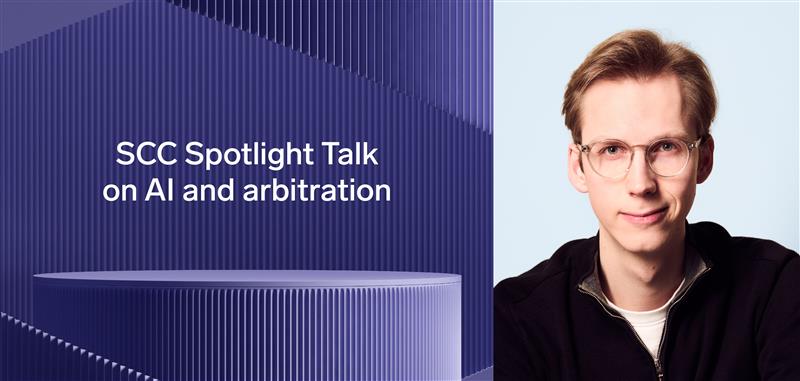SCC Spotlight Talk: Max Junestrand
In this SCC Spotlight Talk, we speak with the Max Junestrand of Legora, a world leader in AI for legal practitioners. As a pioneer at the intersection of legal practice and cutting-edge technology, Max shares how generative AI is transforming dispute resolution and arbitration, from accelerating document review to enabling smarter, more strategic case management.
Published

What is Legora?
Legora is the world’s first truly collaborative AI for lawyers – an AI-powered workspace offering a suite of capabilities to accurately mass-review documents, draft legal texts, research across both firm-specific and external sources, and much more.
It enables faster workflows without compromising on quality, smarter access to firm-wide and public legal intelligence, and a secure, collaborative environment where context is preserved and insight compounds.
Legora has built a reputation for leveraging technology in the legal sector. How do you see AI and automation transforming dispute resolution and arbitration in the coming years?
Gen AI has already proven to be the most impactful technology for dispute resolution and arbitration since the computer. These practices have traditionally been time-consuming and resource-intensive, often involving large volumes of documents, case histories, and evidence. However, over the coming years, we will see every serious legal practitioner adopt an AI-first mindset to utilise the power of machines.
AI excels at processing and analysing vast amounts of unstructured data, including contracts, witness statements, and previous rulings, and LLMs can quickly search, compare, summarise, and extract insights from both complex and multiple documents. This allows legal teams to gain a clear overview of key facts, assess legal risks, and identify patterns across similar cases – often before proceedings even begin.
This shift will redefine the process from being reactive and manual, into proactive and intelligence-driven. In short, we believe AI will make dispute resolution both more effective and strategic, and far more accessible – without compromising fairness or rigour.
What are some of the biggest challenges legal teams face when managing complex projects (such as disputes), and how can technology help streamline these processes?
In our experience, legal teams managing complex projects like disputes often face three persistent challenges: overwhelming volumes of unstructured information, excessive time spent on low-value administrative tasks, and fragmented collaboration across teams and clients. These pain points not only slow progress but also dilute strategic focus.
Technology – especially AI – is beginning to meaningfully address these issues. It can rapidly review thousands of claims or emails to extract relevant data points, assess sentiment, and highlight key risks. It also enables faster, more context-aware drafting by drawing on both precedent and new inputs in real time. On top of that, AI-powered research tools allow legal teams to surface critical information on the fly – even in high-pressure moments like court proceedings. All of this comes together in a shared, intelligent workspace that simplifies execution, strengthens collaboration, and ultimately leads to better legal outcomes.
From your perspective at Legora, how do you see digitalisation impacting arbitration institutions like the SCC, and what should arbitration practitioners do to stay ahead of the curve?
Digitalisation – especially in the form of generative AI – is the most significant leap forward for knowledge work and legal intelligence in our lifetime. At Legora, we’re already seeing legal professionals equipped with machine intelligence outmanoeuvre traditional teams, delivering results once thought impossible. With a single prompt, we can now tap into PhD-level systems capable of reviewing and generating thousands of words per second. For arbitration institutions like the SCC, this isn’t optional – it’s existential. To remain competitive, relevant, and uphold the standards of justice, both institutions and practitioners must not just understand AI – they must actively integrate it into their workflows. Take our own example at Legora: over 70% of our code today is written by AI. Let that sink in. With just 25 engineers, we’re moving faster and delivering more than companies ten times our size. The same dynamic is playing out across the legal sector, including arbitration. That’s why I’m incredibly optimistic. We’re entering a new era – one where great tools amplify great thinking. An era where lawyers and arbitrators can shift focus from manual, low-leverage work to strategic, high-impact outcomes. The ones who embrace this shift won’t just stay ahead of the curve – they’ll redefine it.
Article keywords
Artificial intelligence (AI), Legal technology, Dispute resolution, Document review, Legal AI, Case management, Digital transformation, Arbitration technology, Legal research, Document automation, LLMs (Large Language Models), Legal innovation, Digitalisation, Legal practice technology, Legora.